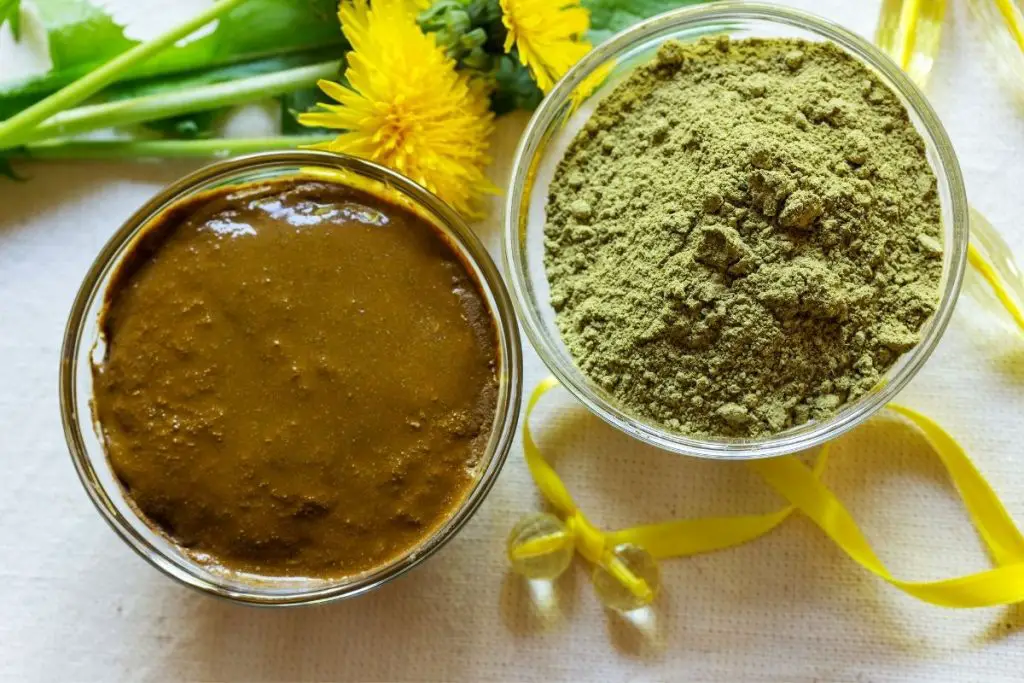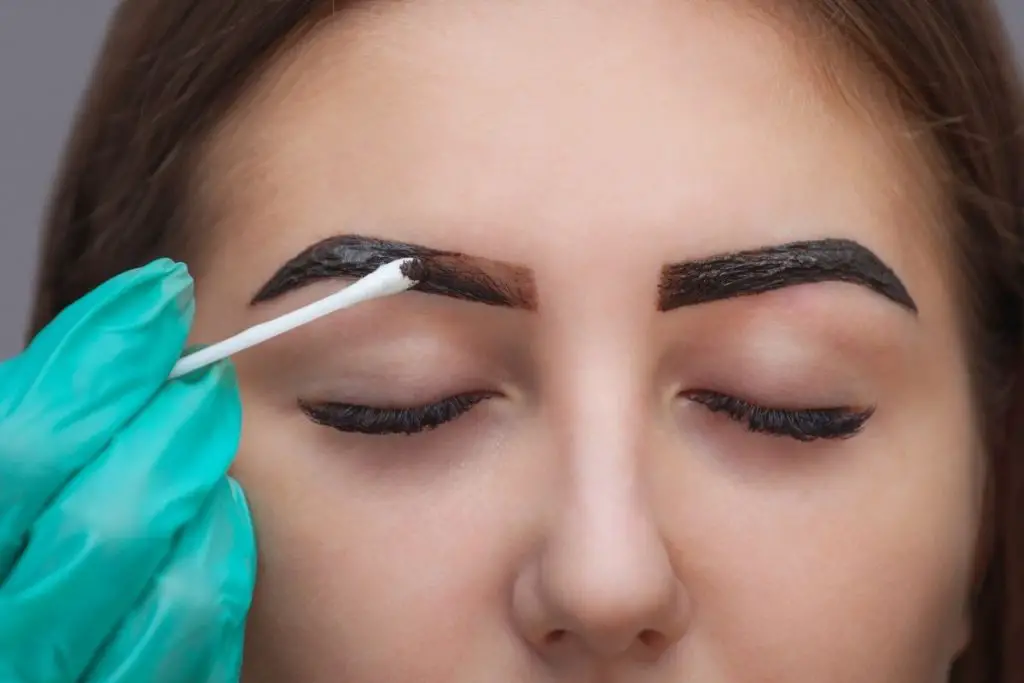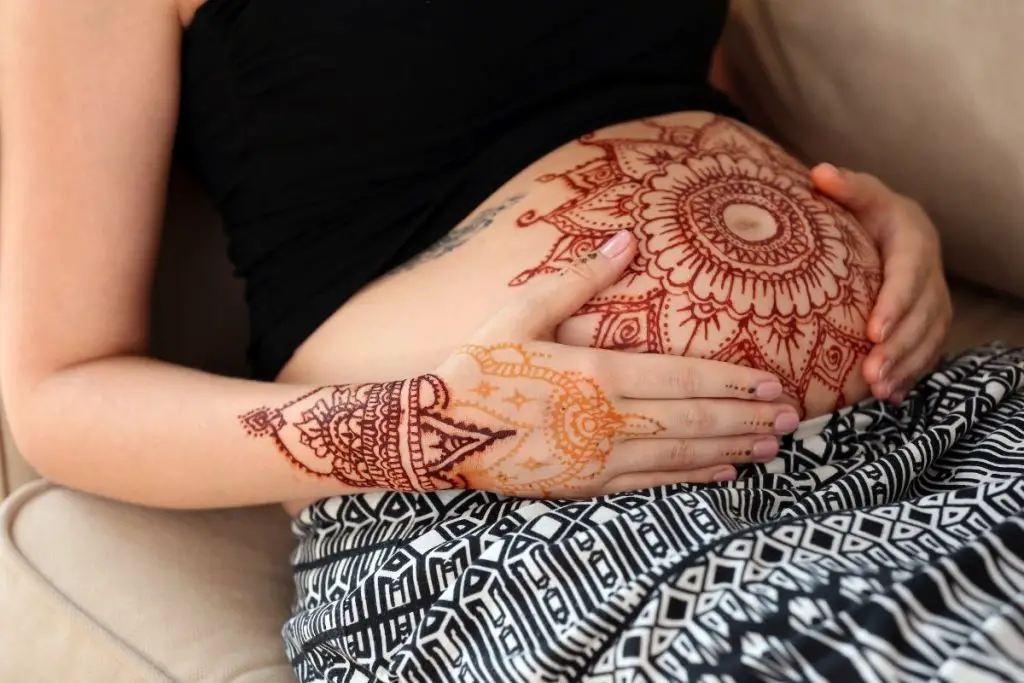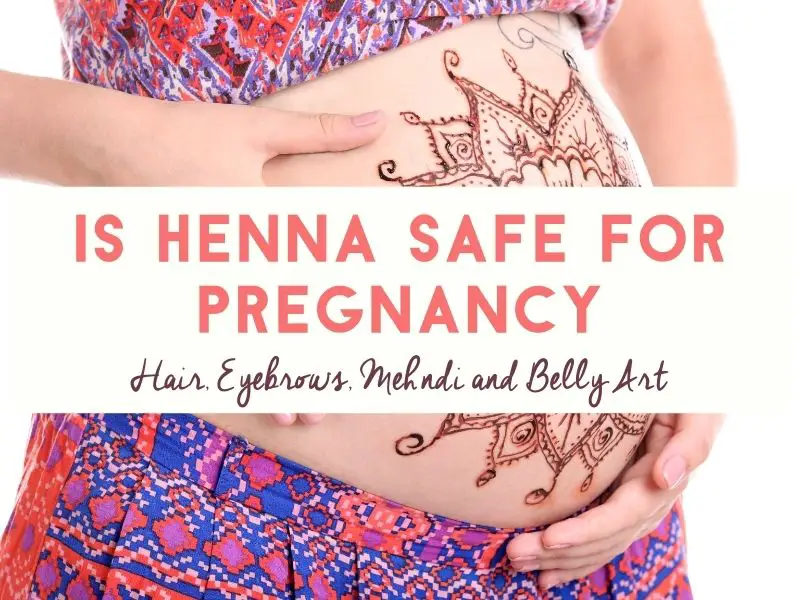Henna (lawsonia inermis) is a small tropical bush that produces a red dye. The henna plant is native to North Africa and the Middle East and its semi-permanent dye has been used for cosmetic and medicinal purposes for over 9,000 years, though its use is fairly new to the western world.
Is Henna Safe to Use During Pregnancy?
Its use for so many millennia, and the lack of information out there saying that henna has ever harmed an unborn baby, may just be good enough for many parents. But, if you’re a worrier like me, you’re probably wondering if it’s like smoking during pregnancy, thought to be safe at one time, but now we know better.
So, is henna safe to use during pregnancy? Yes, when applied to the surface of the skin or as a hair dye, henna is generally safe for use during pregnancy if it’s in its natural state (more on that below). However, some uses of henna are safer than others and even natural Henna should be avoided if you or any of your current children have any of the following conditions:
- Anemia
- Hyperbilirubinemia
- G6DP Deficiency
- Any condition which affects your blood system or immune system
Choosing Henna for Safety
While all henna can be beautiful, not all henna is created equal. There are many different ways to produce a henna product, and some products are not considered safe for pregnancy, so let’s dive into at what you’re looking for.

Ensure it’s 100% Natural Henna
Select your dye carefully, and make sure that the dye you are using is clearly labeled as 100% natural henna. Natural henna stains the skin orange, red, brown, cinnamon, brick, chocolate, or coffee, and can last about one to four weeks. Safe and natural henna does not come in black.
The Problem With Black Henna
Make sure the dye you are using is NOT black henna. The USFDA states it’s received reports of skin injuries from products marketed as henna and products marketed as “black henna.”
“The extra ingredient used to blacken henna is often a coal-tar hair dye containing p-phenylenediamine (PPD), an ingredient that can cause dangerous skin reactions in some people,” The FDA states on their website here.
PPD is well known to cause burns, blisters, and other reactions that can last for months and are difficult to treat.
Where to find 100% Natural Henna Products
If you’re having a professional apply your henna, make sure to tell them you are pregnant and need a 100% natural (and preferably organic) henna powder.
If searching your own DIY henna product, you can find 100% natural henna products at most retailers that sell a wide variety of beauty products. Amazon even has some good options that I’ve found, here are a few:
Please note that some links in this post are affiliate links and I will receive a small commission if you make a qualifying purchase through one of those links (at no additional cost to you).
How Can You Use Henna While Pregnant
Many moms choose to use henna during pregnancy in many ways, and some are safer than others. Here’s a quick look at each way you may or may not choose to use henna, and its safety.
Henna Hair Dye While Pregnant
I’ve written extensively about using hair dyes during pregnancy in this post. If it’s a topic you’re interested in, I recommend reading that article when you get the chance. But in regards to henna hair dyes, the gist is that yes, henna is a safe alternative to chemical hair dyes. In fact, it’s often recommended as a safe alternative to typical hair dyes as many of the chemicals found in regular hair dye can be dangerous during pregnancy.
In short, If you’re looking to use hair dye and want a safe alternative to chemical hair dye, consider using henna. It is safer than other types of dyes and also has many added hair treatment benefits that will leave your locks sleek and shiny!

Henna Eyebrows
Eyebrows are a big deal lately, and henna eyebrow tint is a great way to create shading where you’re lacking definition.
Since henna eyebrows can solve your eyebrow problems for a nice two to four weeks, you may be wondering if you can get henna eyebrows when pregnant? Yes, just like coloring your hair with henna, henna eyebrow tinting is perfectly safe as long as you’re using 100% natural henna products.
Mehndi and Henna Belly Art
It should be noted the USFDA does not approve of henna being used as a temporary tattoo.
“Henna, a coloring made from a plant, is approved only for use as a hair dye. It is not approved for direct application to the skin, as in the body-decorating process known as mehndi,” the FDA states. (Source).
So then, is henna safe for a pregnant belly? Again, according to the FDA, no. But, in general, 100% natural henna (excludes black henna, blue henna, or other henna products with additives) is considered safe and widely used all over the world.
In places such as Morocco and India, it’s a tradition to apply henna “tattoos” during the third trimester of pregnancy. Many of these cultures believe the red dye and patterns used in henna bless the mother and baby, and protect them from evil spirits.
Today, henna belly art is a popular celebration of pregnancy and is a common practice during baby showers and even pregnancy photoshoots. Some pregnant women even plan a henna party, for the sole purpose of her and her friends having their bodies decorated in henna, in celebration of their pregnancy.
In fact, some Muslim women will get temporary tattoos when they are pregnant to commemorate their special time in life and express solidarity with other expecting mothers as well.

Safer Application of Henna Tattoos
If you do choose to get Mehndi or henna art despite the FDA warnings, don’t forget your general safety and comfort as it can take longer than you expect.
Make sure you are sitting or lying in a comfortable position as the artist works, and that you take frequent breaks to stand up and move around, eat, drink, and use the restroom.
When to Discontinue Any Henna Use During Pregnancy
Stop any use of henna and consult a midwife or physician if you experience any of the following:
- Allergic reactions
- Bleeding
- Cramping
- Faintness
- Dizziness
- Elevated blood pressure
- Severe joint pain
Henna During Pregnancy
In conclusion, henna can be a beautiful and natural way to add some beauty and change to your pregnancy as long as you’re mindful of how you’re using it, and what ingredients are in the products you choose.




